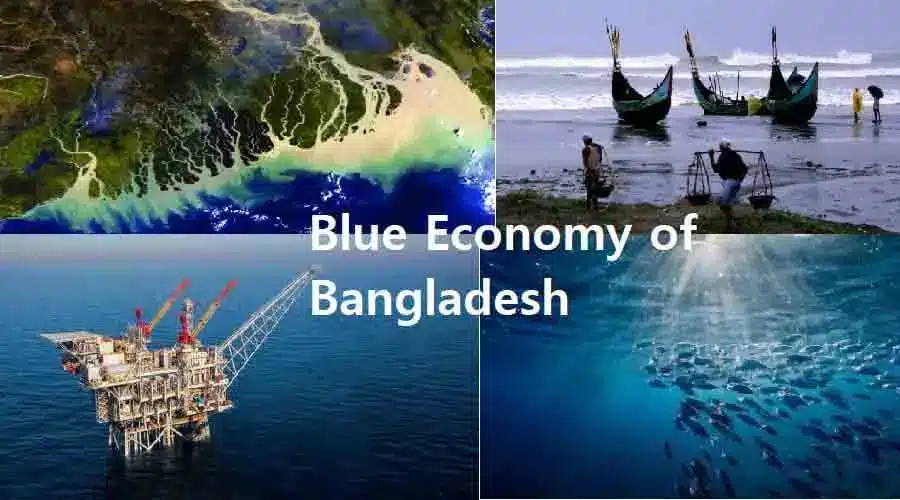 Md Hasanur Rahmna Tanzir :: According to the World Bank, the blue economy is a concept that supports economic growth, social inclusion, and livelihoods, while also ensuring the environmental sustainability of the ocean and coastal areas. The main goal of the blue economy is to create jobs, sustainably use resources, increase income, and strike a balance between saving and investing in the environment. It helps bring economic prosperity through the use of ocean resources while at the same time preventing environmental damage.
Md Hasanur Rahmna Tanzir :: According to the World Bank, the blue economy is a concept that supports economic growth, social inclusion, and livelihoods, while also ensuring the environmental sustainability of the ocean and coastal areas. The main goal of the blue economy is to create jobs, sustainably use resources, increase income, and strike a balance between saving and investing in the environment. It helps bring economic prosperity through the use of ocean resources while at the same time preventing environmental damage.
The concept of the blue economy was first introduced by Belgian economist Gunter Pauli in 1994. However, it gained global importance at the Rio+20 conference in 2012 and is considered one of the main pillars of sustainable development worldwide. The blue economy has created huge potential for Bangladesh, especially with regard to the marine resources of the coastal areas of the Bay of Bengal.
Blue Economy Potential in Bangladesh:
The seas of Bangladesh, the Bay of Bengal, the maritime border and the coastal zone are the mainstay of Bangladesh’s blue economy. Experts believe that the proper use of this vast sea area can bring huge improvements to the country’s economy. After the settlement of maritime boundary disputes with Myanmar in 2012 and with India in 2014 by the International Court of Justice, Bangladesh’s maritime area has increased by 118,813 square kilometers. Now Bangladesh is entitled to an exclusive economic zone of 200 nautical miles, which has a huge amount of natural resources.
This maritime area contains oil, gas, mineral resources, fish and other marine life resources. In particular, Bangladesh has a huge potential for gas and oil, and methane gas (gas hydrate) has also been discovered. Bangladesh has great potential for marine fish extraction, especially deep-sea tuna, tuna-like fish and other valuable marine life. The deep sea of the Bay of Bengal has been found to contain valuable minerals such as ilmenite, titanium oxide, zircon, blue tile, etc., which, if properly extracted, can earn a lot of foreign exchange.
About 8.07 billion people in the world get 15% of their protein from seafood, and 30% of the world’s gas and oil are supplied from the seabed. In other words, the blue economy is very important not only for Bangladesh but also for the global economy.
In addition, the coastal region of Bangladesh has the world’s largest continuous sandy beach with a length of about 120 kilometers, which has potential for tourism. It is possible to create huge potential in the tourism sector by creating beaches and artificial islands. About 5% of the world’s total GDP comes from coastal tourism and about 6-7% of people worldwide get employment opportunities in this sector.
Blue Economy: Challenges in Bangladesh:
There are some challenges to the development of the blue economy that need to be addressed. First, Bangladesh does not have sufficient policies and proper action plans related to the blue economy. There is a lack of accurate information about the blue economy, lack of research based on marine resources, and lack of technical knowledge about the ocean. In addition, there is a lack of marine research vessels required for research.
Secondly, there is a lack of skilled manpower and public awareness in this sector. The number of experts, scientists, and trained workers related to the blue economy is very low. Scientific research on marine life and other resources has not yet been conducted in Bangladesh to an adequate extent. In addition, environmental pollution and man-made problems in coastal areas such as illegal fishing, pollution, land degradation, etc. can hinder the development of the blue economy.
In addition, there is insufficient international and regional cooperation and connectivity in the blue economy sector in Bangladesh. Joint ventures with international organizations are needed for maritime transportation, power generation, extraction of mineral resources, etc.
Proposed activities for the development of blue economy:
Several effective steps can be taken to develop blue economy. First, a national policy on blue economy should be formulated. This includes the provision of necessary equipment, technology and ships for marine research. The maximum use of marine resources can be ensured through advanced technology in collaboration with the government and the private sector.
Secondly, research and training opportunities in the blue economy sector should be increased. Especially, adequate funding and international cooperation are needed for research on fisheries, marine biology, maritime transport, blue growth, and marine mineral extraction.
In addition, the construction of deep sea ports and modernization of ports are needed for the development of the local shipbuilding industry and the expansion of international trade. The coastal zone of Bangladesh can be made more efficient and environmentally friendly through the use of new technologies.
Ocean Energy Production:
Ocean energy production is an important component in the development of the blue economy. It is possible to generate electricity from ocean waves, tidal movements, and temperature differences. With the help of current technology, this type of energy production can be very important for Bangladesh. For this, research and experimental projects need to be conducted.
The blue economy can be an area of great potential for Bangladesh. However, there are many challenges in its development, which can be solved through government action and international cooperation. Effective planning and implementation in the blue economy sector, investment in the use of science and technology, and increasing awareness among local people will be helpful in the development of this sector. Through the blue economy, Bangladesh will not only achieve economic growth, but will also be able to set an example in environmental protection and the sustainable use of marine resources.



